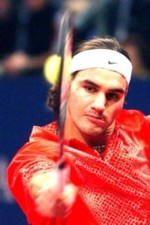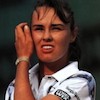Roger Federer
What's the secret to his success?

|
| Do you want to see Roger in super slow motion? Click here... |
But how did Roger Federer become such a good player and what are his special abilities or mental traits that make him such a superb player?
If you take a look at his career you'll find that his path to the top was not easy at all:
In 1998 – aged 17 – he entered 4 ATP tournaments and lost 3 times in the first round.
In 1999 he played 21 ATP tournaments and even played at Ljubljana Challenger – the capital of Slovenia. (That’s my home country) And he lost 8 times in the first round and 4 times in the second. He won one challenger event in the whole year.
In 2000 - aged 19 – he lost 5 times in a row and later 7 times in row in the first round but started to get higher and higher in the tournaments. All in all he lost 14 times in the first round! He also lost two finals that year and finished the year at nr. 28. Interesting fact - he lost to Michael Chang at Halle on grass in the 3rd round!
In 2001 he finished the year at nr. 12 but still lost 6 times in the first round (or his first match he played since he had a »bye« twice in the first round. That was also the year he won that fantastic match against Pete Sampras in Wimbledon 7:5 in the fifth set.
By 2002 you might think that Roger Federer has already achieved his mental mastery but he still had some very tough losses: - against Tommy Haas in Australian Open (R16) 6:8 in the fifth set
- against Davide Sanguientti in the finals if Milan 1:6 in the third
-against Agassi in the finals of Miami – 1:3 in sets (Agassi later commented in his interview that »when Roger Federer learns how to play tennis at this top level we're all in trouble«.)
- lost in the first round of Wimbledon against Mario Ančič 0:3!
He finished that year at nr. 6.

|
He lost in the finals of Gstaad just after Wimbledon against Jiri Novak and hadn't lost a final until the masters cup 2005 against Nalbandian.
That's an incredible run of 24 consecutive wins in the finals!
So what can we learn from Roger Federer?
First, he had to go through very tough times – he lost 5 and 7 times in a row in the first round in 2000. Many players would make the conclusion that they can't make it, that they are losers and so on. But the past does not define the future unless we decide it to. Roger Federer didn't think that because he lost 14 times in the first round that year he can't make it big on the ATP tour. He practiced harder, smarter, learned his lessons and moved on.
He also lost 2 finals (and later some more) and didn't allow that to become his nightmare scenario. He knew this is just a part of the learning and growing process that every player goes through.

|
He can play:
- percentage tennis from the baseline
- he can play aggressively - forehand!
- he can serve & volley
- he knows how to adapt his game to any surface
- and of course much more...
If you would like to know what kind of strategies Roger Federer uses and how you can become an expert tennis strategist too, then check Tennis Strategy Encyclopedia.
It contains a detailed statistical analysis of a Federer-Agassi US Open 2005 final and what can you apply to your game from their match tactics.

|
But even when you're thinking that you don't want to lose you're still thinking about losing. These thoughts make you feel very anxious and afraid. When you go and start playing in this state you are miles away from your best performance. And when you notice that you realize that there is even a bigger chance of losing that day. That makes you feel even more tense and insecure. It becomes a self fulfilling prophecy.
Roger Federer on the other hand seems to explode in the finals. Last year's US Open against Agassi was a perfect example. Roger didn't play at his best a couple of previous rounds but when he started the match against Agassi he was simply destroying him with aggressive and attacking play.
How does Roger do that? He is focused on what he wants. He wants to win, he can feel how it would be to win and with that feeling and that positive thinking he generates a lot of energy. He goes for what he wants and doesn't think what he wants to avoid. The only thoughts in his mind are about the winning, the trophy and his feeling about it.

|
And that is his next special ability – he can enter the zone almost on command. He is the master of Inner Game where he plays instinctively, courageously and creatively. We can easily detect that when we observe how his head remains still after the point of contact. The reason for that is that his MIND IS STILL at the point of contact. He is not worried, afraid, doubtful in thinking ahead. He is fully present in that specific moment of striking the ball. And he moves on with his mind and body when the stroke is finished.
The other inner game quality that he possesses is the ability of non-judgment. Roger Federer is not perfect (even though some think so :)) and he makes unforced errors too. But you will rarely see him show any emotion about that. He accepts them as a part of the game and remains focused on his goal – what he wants – instead of that he doesn’t want – to make mistakes.

|
He is focused on what he wants and he goes for it. This is very important because we have the ability to control our thinking if we decide to. Focus on what you want.
He is also the master of being in the here and now. Practice staying in the point of contact of the ball and check the Watch the ball article explaining this process. The Inner Game section will help you understand this ability even more.
Roger Federer plays in the state of acceptance – or as Timothy Gallwey calls it – non-judgment. He accepts negative or disturbing events and his own mistakes and limitations as a part of the game and a part of himself. He doesn't judge them and feel bad about them. It would immediately take him out of the zone.
Observe that in him and other tennis players and look for the moments when you experience that. Then build on that until it becomes your second nature. An then you'll be free.

|
You'll learn:
- how to deal with bad line calls
- how to psychologically recover from a lost set
- how to stay focused even when you won a set
- how to properly analyze a tennis match and improve more
You may also like -








